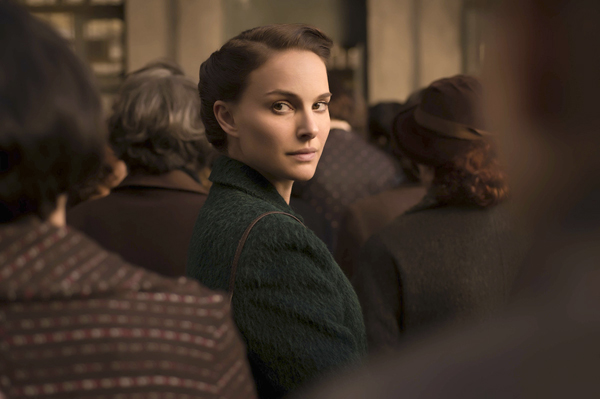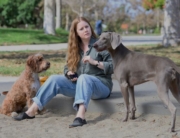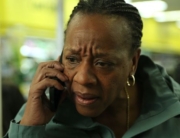Natalie Portman debuts as a feature writer/director by deftly and strikingly adapting the long and digressive family memoir of Amos Oz, one of Israel’s most prominent writers and intellectuals. She warmly hones this portrait of a storyteller as a young man through his childishly humorous view of the turbulent 1940s in Jerusalem. Beyond nostalgia, Portman also sympathetically embodies the author’s mother, Fania, who was the heart of his autobiography. The author’s adult self aches to understand her influence and why she committed suicide at age 38, when he was only 12.
A ruminating septuagenarian storyteller, Amos (seen as Alex Pelegm, voiced in the narration by Moni Moshonov) looks back to 1945, when his 10-year-old self (Amir Tessler) and his mother’s and father’s family lived in Jerusalem after their parents reluctantly followed their Zionist ideology to Palestine during the mid-1930s. This was a time when Eastern Europe’s increasingly vociferous anti-Semites were encouraging Jews to emigrate, even Germany’s National Socialists, as remembered in Arnon Goldfinger’s The Flat (2011).
His parents came from cities that went back and forth between Polish and Russian control during the early 20th century. Amos’ father, Arieh Klausner (Gilad Kahana), longs for a career as a scholar of literature when he meets Fania Mussman, a fellow student at Hebrew University. He’s proud to finally have one slim study published, The Novella in Hebrew Literature, while she tries to adjust from growing up in a big house with servants to living with the poverty of disillusionment of her Zionist dreams. When she looks at her pale librarian husband in their cramped basement apartment, she imagines seeing instead “The Pioneer” (Tomer Kapon), the mythic, hunky kibbutznik/farmer/dancer/soldier from the Zionist songs she learned in youth groups.
A weekly secular ritual symbolizes these strains: Dressed formally, the family marches determinedly down the narrow stone streets of the Old City, past patrols of British Mandate soldiers, to a nearby pharmacy where they nervously wait for the scheduled long-distance call from Fania’s sisters in Tel Aviv. Anxiously, they exchange confirmations that everyone in the family is fine and then walk home relieved. These reassurances are not as comically useless as they seem, given that many relatives wouldn’t emigrate and therefore died in the Holocaust. Fania tells her son family legends to keep alive her memories, which are beautifully filmed by cinematographer Slawomir Idziak, returning to a smaller film after several Hollywood-scale productions. Fania’s grim tales are like dark flashbacks, full of foreboding storms and threats.
In November 29, 1947, these same streets are crowded with neighbors and strangers, seeking to hear the broadcast of the United Nations’ vote on the establishment of Israel. The loud explosion of joy, however, is quickly followed by war, rations, blackouts, and death nearby. After the uneasy peace, Fania starts sinking more and more into a mysterious, overpowering depression, much like the 19th century melancholia in the Russian books she prefers to read.
Amos’s memories of a childhood spent amidst tensions outside in the streets and inside his home recall John Boorman’s autobiographical Hope and Glory (1987), about a kid living through London’s Blitz. (Amos’s climbing a tree with two Arab children goes from a fun outing to a potential international incident in slow-motion.) He begins to learn the power of his mother’s legacy when he figures out how to protect himself, and outsmart school bullies, by spinning yarns as daily cliff-hangers. In the epilogue in 1953, 16-year-old Amos (Yonatan Shiray) welcomes his father to the kibbutz that adopted him, where he has changed his European name and now looks very much like his mother’s ideal.
Achieving both a literary and painterly feel, Portman’s refreshingly stereotype-free portrayal of Jewish families in Jerusalem during this period is a lovely tribute to both a great writer and his muse.







Leave A Comment